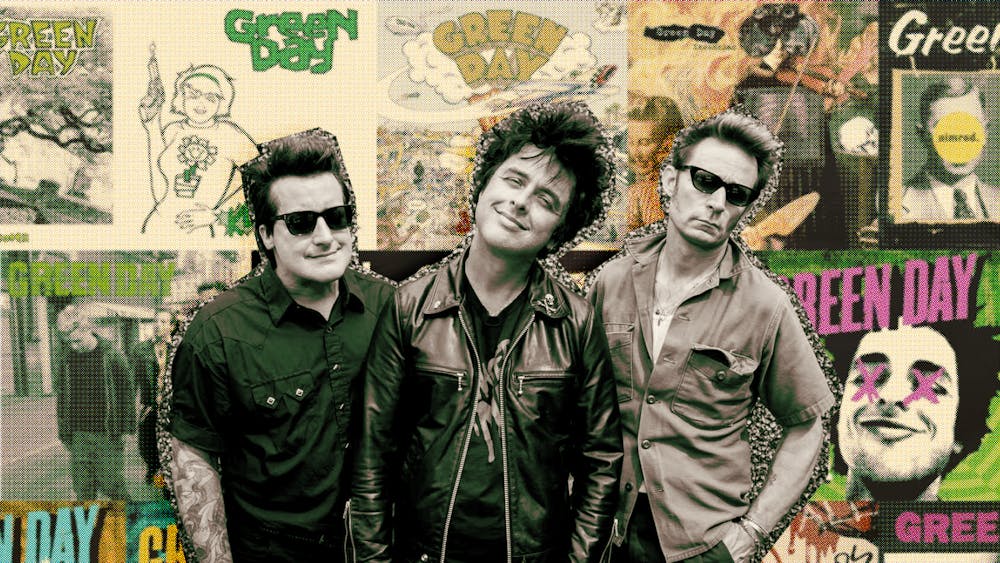If you’re at all keeping up with the ever–vibrant pop punk scene, you may have had the time to listen to all 46 glorious minutes of Green Day’s 14th studio album, Saviors.
Released late last month, the album boasts fifteen tracks with titles which, in proper Green Day fashion, perfectly embody the searing sociopolitical sentiments of the frontman and his crew. Saviors’ release also marks 30 years since Dookie, the band’s first breakout success.
Within that 30–year stretch, Green Day’s music has been and become many things: punk anthems, rock operas, and electric jams, sure. But also introspective, heartfelt ballads; acoustic love songs; and garage rock. Their raunchy, punk–rock sound of the late ‘90s has evolved since the turn of the century to embody the melodic pop sensibility we know today. Saviors is a perfect blend of everything in their past discography, making it a major step up from their previous album, Father of All Motherfuckers. The album everything that makes Green Day, well, Green Day. A spiritual successor to Nimrod, if you will.
But what makes Saviors particularly resonant isn’t its melody or lyrics, which echo the same adversarial melancholy that they did in 2004. The album manages to weather the storm of changing musical tides. It preserves an element essential to artistic survival: sound. At first glance (or listen), this might not seem like such an impossible feat, but think of those bands whose susceptibility to the undertows of the contemporary musical landscape has led them to conform to formulae. In today’s music industry, a sea of lamestream media and desultory singles, a distinguishable sound is the most effective flotation device.
But this sound, in addition to its durability, is most deeply appreciated by returning listeners. While you might argue that there is a fine line between commitment and redundancy, I’d say they go hand in hand. Sure, the affections of “American Idiot” are rehashed (probably with less finesse) in “The American Dream is Killing Me,” but more evocatively, “Father to a Son” can be seen as the acoustic dad–rock sequel to the “Wake Me Up When September Ends.”
In the end, it’s far more comforting to snuggle up to the sound of Armstrong’s gravelly voice than listen to some contemporary overhaul of musical authenticity—even if that means heeding the relentless crash of cymbals over the thump of the same baseline, the same raspy chorus hollering something angry and indecipherable that resonates deeply with angst–ridden teenage restlessness. Surely no one is more well–suited to accommodating these needs than this middle–aged trio.
Believe it or not, commitment to vocal identity might be a formidable strategy amidst an evolving music industry. If my words could fall on the ears of every musical group whose discography is old enough to remember the Clinton administration, I’d whisper, “lose the you–jump–I–jump attitude.” This kind of conformity is unnecessary, especially for a band as iconic as Green Day, whose image as pop–punk stalwarts is evergreen. I don’t doubt that this image has much to do with a certain degree of sonic fortitude. Artists can exude a confidence in their craft that strengthens this image.
Green Day proves that longevity in the music industry isn’t just reserved for the flavor of the month, and they aren’t the only ones: Musical titans such as Pearl Jam and the Foo Fighters also harbor an admirable commitment to their craft.The contemporary music industry has a propensity for rapid change that clashes with the desire to preserve a sonic identity. This can especially exert pressure on older bands. Many, whether resurfacing after a hiatus or consistently releasing new music, find themselves at the crossroads of conformity, where the industry’s demand for novelty clashes with the desire to preserve the essence that defined their musical identities. Let Green Day’s latest composition remind you: If it ain’t broke, don’t fix it.






